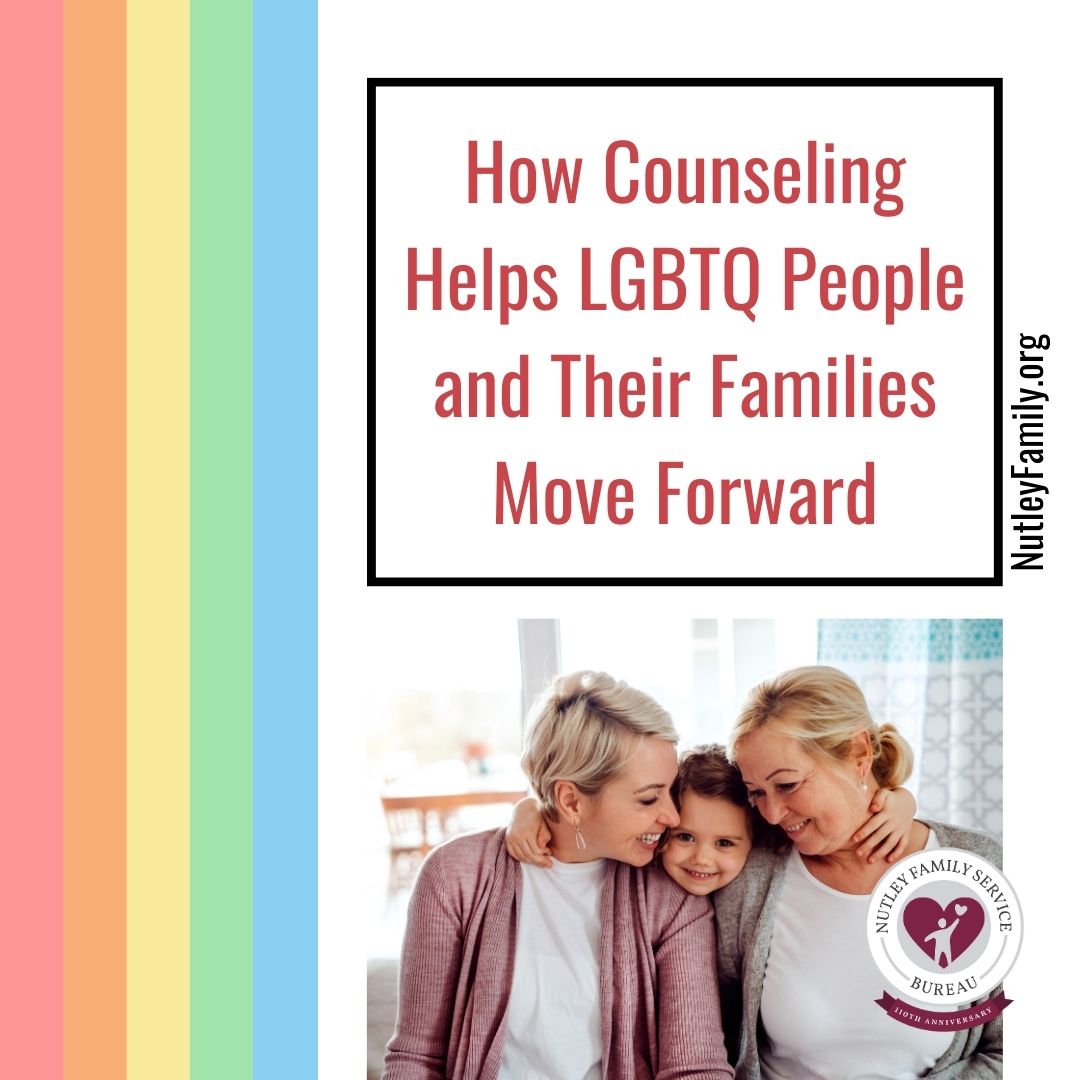-
How Counseling Helps LGBTQ People and Their Families Move Forward
- Posted on June 27, 2023
- by admin
- in All Articles, Mental Health, NFSB Blog
- Comments Off on How Counseling Helps LGBTQ People and Their Families Move Forward

It’s not uncommon for parents and families to experience feelings of anxiety or loss when they learn a loved one is gay, lesbian, bisexual, or transgender. Creating a safe space to discuss these feelings without jumping to conclusions is the first step to helping a family move forward.
“Parents will often fast forward to the worst possible scenario,” said Staela Keegan, MSW, LCSW, LCADC, Senior Clinical Supervisor at Nutley Family Service Bureau (NFSB). “They worry that their child will be bullied or become an outcast. They might wonder if they’ll be able to have children. In any situation, we need to stay in the moment and take it one step at a time.”
In many cases, especially involving children, an individual could be struggling to accept and understand who they are. Family members could be facing the same struggles. Even when parents and siblings are totally supportive because they only want their family member to be happy, they still have to work through feelings of their own to get to a place of understanding and acceptance.
Coping with Loss and Grief
“It’s natural for family members to feel a sense of loss or grief,” Staela said. “The person they know is still there, but they seem different now. Maybe the family member’s vision for their loved one’s future will change. While this isn’t the same as grieving after someone passes away, the feelings of grief are very real and people need help coping.”
Once a family member can relate to another on an emotional level, biases are more likely to be put aside out of love and respect. However, grieving is often part of that acceptance process.
In other cases, the relationship with the family is in a bad place by the time we see a client. We saw a transgender client who had been receiving gender-affirming care while preparing for surgery despite serious objections from the family.The clinician asked permission to bring the family into counseling to gain clarity on the client’s perspective and the family’s beliefs. They still have a long way to go, but they’ve made meaningful progress in repairing their relationships.
Bringing Families into Therapy
When a counselor seeks to include family members in counseling to discuss the client’s gender identity or sexual orientation, the client often resists. Instead of simply abandoning that suggestion, the counselor will discuss what topics the client does and does not feel comfortable discussing with family. They might role play based on what they think will happen during a family session. This can help to reduce anxiety.
“Counseling sometimes has a ripple effect,” Staela said. “When we look at the bigger family system rather than an individual, we’ll be in a better position to identify and address the source of the problem. We recently saw a teenager who was struggling with their gender identity. By bringing the whole family into counseling, the teenager was able to find clarity and the parents gained a better understanding of their family system.”
An important role of the counselor is that of a mediator who can diffuse a tense situation and create an atmosphere of open communication and respect. When there’s a shared purpose to find common ground and build understanding, the outcome is usually positive. When the family won’t even come together to talk, they’re far more likely to stay apart.
NFSB clinicians have experience counseling the LGBTQ community and their families. We want parents, siblings, and extended families to know that it’s okay to be anxious or confused. It’s okay to not know what to say or how to feel. That’s why we’re here.For the sake of your own mental health and your relationship with your loved one, let’s talk about it and work through those feelings. To schedule an appointment, call the Mental Health Center at NFSB at 973-667-1884. Immediate appointments are available and we’ll always respect your privacy.
If you enjoyed this article please consider sharing it!
Archives
- April 2024
- March 2024
- February 2024
- January 2024
- December 2023
- November 2023
- September 2023
- August 2023
- July 2023
- June 2023
- May 2023
- April 2023
- March 2023
- February 2023
- January 2023
- December 2022
- November 2022
- October 2022
- September 2022
- August 2022
- July 2022
- June 2022
- May 2022
- April 2022
- March 2022
- February 2022
- January 2022
- December 2021
- November 2021
- October 2021
- September 2021
- August 2021
- July 2021
- June 2021
- May 2021
- April 2021
- March 2021
- January 2021
- December 2020
- November 2020
- October 2020
- September 2020
- August 2020
- July 2020
- June 2020
- May 2020
- March 2020
- January 2020
- November 2019
















